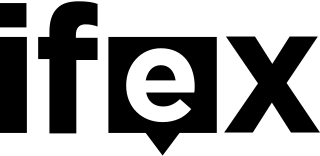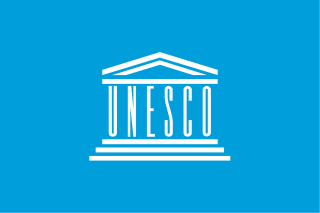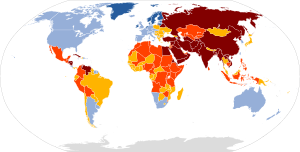The Windhoek Declaration for the Development of a Free, Independent and Pluralistic Press, the Windhoek Declaration for short, is a statement of press freedom principles by African newspaper journalists in 1991. The Declaration was produced at a UNESCO seminar, "Promoting an Independent and Pluralistic African Press," held in Windhoek, the capital of Namibia, from 29 April to 3 May 1991.

Reporters Without Borders is an international non-profit and non-governmental organization focused on safeguarding the right to freedom of information. It describes its advocacy as founded on the belief that everyone requires access to the news and information, in line with Article 19 of the Universal Declaration of Human Rights that recognises the right to receive and share information regardless of frontiers, along with other international rights charters. RSF has consultative status at the United Nations, UNESCO, the Council of Europe, and the International Organisation of the Francophonie.

IFEX, formerly International Freedom of Expression Exchange, is a global network of more than 120 independent non-governmental organisations that work at a local, national, regional, or international level to defend and promote freedom of expression as a human right.

Freedom of information is freedom of a person or people to publish and consume information. Access to information is the ability for an individual to seek, receive and impart information effectively. This sometimes includes "scientific, indigenous, and traditional knowledge; freedom of information, building of open knowledge resources, including open Internet and open standards, and open access and availability of data; preservation of digital heritage; respect for cultural and linguistic diversity, such as fostering access to local content in accessible languages; quality education for all, including lifelong and e-learning; diffusion of new media and information literacy and skills, and social inclusion online, including addressing inequalities based on skills, education, gender, age, race, ethnicity, and accessibility by those with disabilities; and the development of connectivity and affordable ICTs, including mobile, the Internet, and broadband infrastructures".

The International Federation of Journalists (IFJ) is the largest global union federation of journalists' trade unions in the world. It represents more than 600,000 media workers from 187 organisations in 146 countries.
The New World Information and Communication Order is a term coined in a debate over media representations of the developing world in UNESCO in the late 1970s early 1980s. The NWICO movement was part of a broader effort to formally tackle global economic inequality that was viewed as a legacy of imperialism upon the global south.

May Chidiac is a journalist and former Lebanese Minister of State for Administrative Development.

The Belarusian Association of Journalists (BAJ) is a Belarusian professional association of journalists from independent media, created in 1995 to protect freedom of speech, freedom of information, promote the professional standards of journalism, conduct monitoring of Belarusian press, and offer legal support to all media workers.

El Espectador is a newspaper of national circulation within Colombia, founded by Fidel Cano Gutiérrez on March 22, 1887, in Medellín and published since 1915 in Bogotá. It transition from a daily to a weekly edition in 2001, following a financial crisis, and again with a daily released since May 11, 2008, a comeback which had been long rumoured, in tabloid format. From 1997 to 2011 its main shareholder was Julio Mario Santo Domingo.
The UNESCO/Guillermo Cano World Press Freedom Prize, created in 1997, honours a person, organization or institution that has made an outstanding contribution to the defence and/or promotion of press freedom anywhere in the world, especially when this has been achieved in the face of danger.
Source protection, sometimes also referred to as source confidentiality or in the U.S. as the reporter's privilege, is a right accorded to journalists under the laws of many countries, as well as under international law. It prohibits authorities, including the courts, from compelling a journalist to reveal the identity of an anonymous source for a story. The right is based on a recognition that without a strong guarantee of anonymity, many would be deterred from coming forward and sharing information of public interests with journalists.

Guillermo Cano Isaza was a Colombian journalist. The editor of El Espectador between 1952 until 1986, he was assassinated in Bogotá in what was widely seen as an attack related to his criticism of Colombia's drug barons.

The United Nations Educational, Scientific and Cultural Organization (UNESCO) is a specialized agency of the United Nations (UN) with the aim of promoting world peace and security through international cooperation in education, arts, sciences and culture. It has 194 member states and 12 associate members, as well as partners in the non-governmental, intergovernmental and private sector. Headquartered in Paris, France, UNESCO has 53 regional field offices and 199 national commissions.

Mazen Darwish is a Syrian lawyer and free speech advocate. He is the president of the Syrian Center for Media and Freedom of Expression. News organizations, including Reuters and the Associated Press, have described him as one of Syria's most prominent activists. He was imprisoned in Syria from 2012 until his release in August 2015.
The 2012 Veracruz murder of journalists is about the disappearance, murder and dismemberment of three journalists and a woman who worked in public relations whose bodies were discovered in Boca del Río, Veracruz, Mexico. Their bodies were recovered from a canal on World Press Freedom Day, or 3 May 2012, and showed signs of torture and mutilation, which prompted calls for investigations into links with organized crime. The gruesome murder followed other murders of members of the press in the Veracruz area and during the Mexican drug war, and highlighted the danger for working journalists.

Reeyot Alemu is an Ethiopian journalist who served a 5-year prison sentence following an unfair trial in which anti-terrorism laws were used to silence her writing. She won the UNESCO/Guillermo Cano World Press Freedom Prize in 2013.

Michel Forst is a French national actively involved in the defence of human rights. Former Secretary General of the French national human rights institution, he was the United Nations Special Rapporteur on the situation of human rights defenders from June 2014 to March 2020.

Mahmoud Abu Zeid, also known as Shawkan, an Egyptian photojournalist, was arrested for taking photos of the Rabaa massacre in Cairo, Egypt and imprisoned during the post-coup unrest by the Egyptian government since 2013, where he faced the death penalty. By September 2018 he had been sentenced to a five-year prison term and was expected to be released shortly thereafter; he was released on 4 March 2019.

Safety of journalists is the ability for journalists and media professionals to receive, produce and share information without facing physical or moral threats.

Kyaw Soe Oo is a Myanmar Reuters journalist who, with fellow reporter Wa Lone, was arrested on 12 December 2017 in Myanmar because of their investigation into the Inn Din massacre. A police witness testified that their arrests were a case of entrapment. It is believed their arrests were intended to intimidate journalists.
















